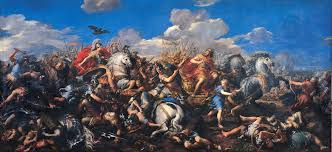The Battle of Gaugamela stands as one of history’s most iconic military engagements. Fought on October 1, 331 BC, this epic confrontation between Alexander the Great and King Darius III of Persia marked the culmination of Alexander’s ambitious campaign to conquer the Persian Empire. This article delves into the events leading up to the battle, its strategic brilliance, and its profound impact on history.

Introduction
Picture a battlefield stretching as far as the eye can see, with tens of thousands of soldiers poised for combat. At its heart stands a young Macedonian king, Alexander the Great, a military genius whose name would echo through the ages. His opponent? Darius III, ruler of the vast Persian Empire, determined to defend his dominion. The Battle of Gaugamela was more than a clash of armies it was a turning point in world history.
Background of the Persian Empire
Before Alexander’s campaign, the Persian Empire was the largest and most powerful empire of its time. Spanning three continents, it was a beacon of wealth and culture. However, internal strife and complacency had begun to weaken its once-formidable military.
Alexander’s Ambitions
Alexander ascended to the Macedonian throne in 336 BC after the assassination of his father, King Philip II. Driven by a vision of uniting East and West, Alexander sought to conquer the Persian Empire. By 331 BC, he had already achieved remarkable victories at the battles of Granicus and Issus, setting the stage for his ultimate confrontation with Darius III.
The Road to Gaugamela
After his victory at Issus in 333 BC, Alexander pushed deeper into Persian territory. Darius III, desperate to halt Alexander’s advance, prepared for a decisive battle. He chose the plains of Gaugamela, near modern-day Erbil in Iraq, for its open terrain, ideal for deploying his vast army and war elephants.
The Armies at Gaugamela
The Persian army significantly outnumbered Alexander’s forces, with estimates ranging from 100,000 to over 200,000 troops compared to Alexander’s 40,000. Darius’s forces included infantry, cavalry, chariots, and war elephants, showcasing the empire’s diverse military capabilities. In contrast, Alexander’s army relied on discipline, strategy, and innovative tactics.
Alexander’s Military Genius
Alexander’s ability to adapt to any battlefield situation was unparalleled. At Gaugamela, he employed a diagonal formation, drawing Persian forces toward his flanks while creating openings for a decisive attack. His use of a flexible phalanx combined with light infantry and cavalry was revolutionary.
Also Read: Eugenics in Medicine: How Science Perpetuated Racism
The Battle Begins
As the sun rose on October 1, 331 BC, Alexander’s army advanced toward the Persian lines. Darius unleashed his chariots and war elephants, but Alexander’s troops used disciplined countermeasures, creating gaps to neutralize these formidable units.
The Decisive Moment
The turning point came when Alexander led a daring cavalry charge directly at the Persian center, targeting Darius himself. This bold move caused chaos among the Persian ranks, forcing Darius to flee the battlefield. His retreat demoralized the Persian army, leading to a complete rout.
Aftermath of the Battle
The Battle of Gaugamela marked the end of the Persian Empire’s dominance. Darius III fled eastward but was eventually betrayed and killed by his own men. Alexander continued his campaign, consolidating his control over Persia and earning the title “King of Asia.”
Strategic Insights
The battle showcased Alexander’s strategic brilliance and ability to turn numerical disadvantages into victories. His understanding of terrain, timing, and troop deployment set a benchmark for military tactics studied even today.
Alexander’s Leadership
Alexander’s charisma and leadership were pivotal to his success. He inspired loyalty among his troops, leading from the front and sharing their hardships. This bond between leader and soldiers was a key factor in his unbroken string of victories.
The Legacy of Gaugamela
Gaugamela wasn’t just a military triumph; it symbolized the dawn of a new era. Alexander’s conquest spread Greek culture and ideas across the known world, laying the foundations for the Hellenistic period.
Darius III: A Fallen Emperor
Darius III’s defeat at Gaugamela cemented his legacy as a ruler who underestimated his opponent. Despite his efforts to rally his empire, he could not match Alexander’s tactical brilliance or unify his diverse forces.
Impact on the Ancient World
The fall of the Persian Empire reshaped the political landscape of the ancient world. Alexander’s empire introduced cultural exchanges between East and West, influencing art, science, and philosophy for centuries.
Lessons from Gaugamela
The Battle of Gaugamela offers timeless lessons in leadership, strategy, and the importance of adaptability. Alexander’s ability to innovate and inspire serves as a blueprint for success in both military and civilian arenas.
Conclusion
The Battle of Gaugamela was more than a clash of armies; it was a battle of wills, strategies, and civilizations. Alexander’s victory not only toppled an empire but also changed the course of history. His triumph at Gaugamela remains a testament to the power of vision, determination, and leadership.
FAQs
1. What was the significance of the Battle of Gaugamela?
The battle marked the fall of the Persian Empire and established Alexander the Great as a dominant force in the ancient world.
2. How did Alexander win despite being outnumbered?
Alexander’s innovative tactics, strategic planning, and leadership turned his numerical disadvantage into a decisive victory.
3. Where is Gaugamela located today?
The battle took place near modern-day Erbil in Iraq.
4. What happened to Darius III after the battle?
Darius fled the battlefield but was later betrayed and killed by his own men.
5. How did the Battle of Gaugamela impact world history?
It marked the beginning of the Hellenistic era, spreading Greek culture and ideas across the ancient world.


